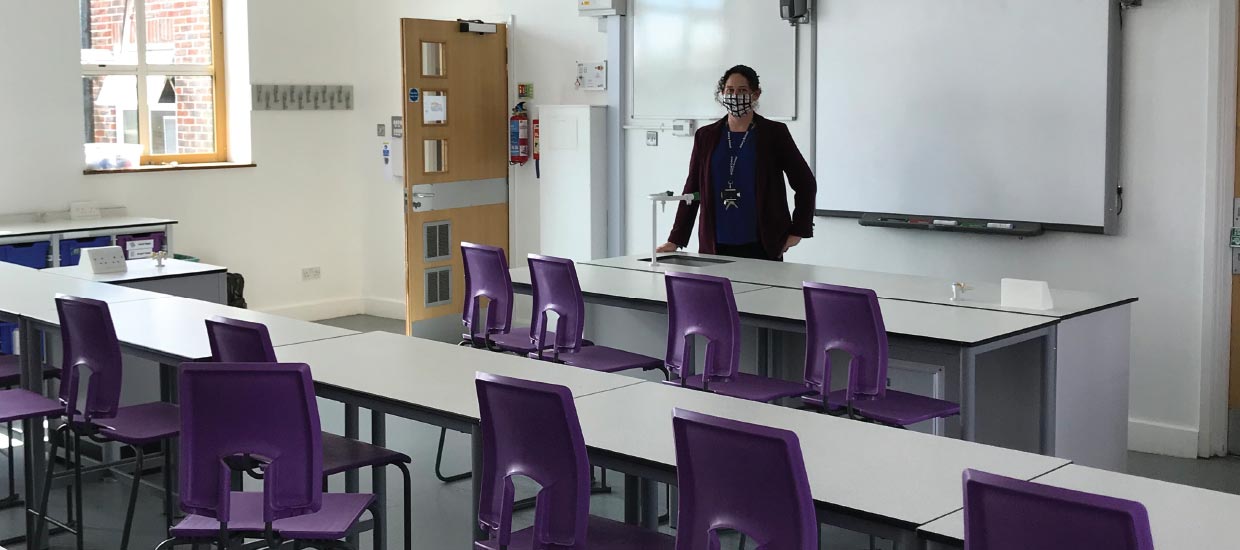Flog it
Raising money to refurbish two food tech rooms was pretty straightforward for school fundraiser Amanda Burgess. Doing the same for three science labs proved more tricky. Until, that is, she put some old classroom furniture up for sale…

My job as a part-time fundraiser at Priory School, an 11-16 mixed comprehensive in East Sussex, involves a lot of juggling – much of it around formulating income-generation activity and agreeing which of the many needs to prioritise! There is always another area that’s in need of refurbishment or financial input, so as soon as one project is up and running, I move on to the next.
In 2018, we secured enough funding to refurbish both of our food preparation and nutrition rooms. The rooms, installed in 2003, had become very tired and worn, and there was a shortage of basic equipment and technology. We wanted to provide our students with the high-quality experience of a working kitchen, inspiring them to achieve their best and opening up doors into further education and careers in the hospitality industry.
We pride ourselves on encouraging every student to reach their potential and have welcomed changes in the curriculum to include an increased emphasis on food and nutrition. We have found that the mix of practical activity and creativity, numeracy and literacy not only engages students of all abilities, but also reaches far beyond the school gates.
Although food preparation and nutrition is not a statutory subject, grant funders were responsive to the argument that it was an important life skill. We were also able to demonstrate that having modern facilities would have clear, positive outcomes for our students.
We received large grants from the Savoy Educational Trust (£30,000), Garfield Weston (£10,000) and the Southover Manor Trust (£10,000), as well as a smaller donation of £3,818 from Tesco Groundworks. The Friends of Priory also did an outstanding job, raising £30,000 from events and parental donations.
The next task on the ‘to do’ list for our school improvement programme was to update our three old science labs. We wanted to replace all the existing fixtures and fittings in the labs, in order to provide our students with a modern environment and equipment that would engage them with science and inspire them to join the next generation of scientists.
However, securing the necessary funds and bringing people on board with the campaign proved to be an immense challenge. Even though it was clear that better equipped labs were more likely to motivate students to continue to study science, I found that grant funders in this field were far more geared towards specific projects than facilities and buildings.
The Friends of Priory managed to raise £15,000 and we did receive enough parental donations to match-fund a few small grants, including £3,000 from the Fonthill Foundation, £889 from the Armorers and Brasiers’ Company, and £390 from Waitrose. But I was struggling.
Then, quite unexpectedly, I hit gold. The school had accumulated a stockpile of old classroom furniture that needed to be disposed of and I decided to see if I could make a few pounds for the science labs campaign by selling it. Within a few hours of sending out a mailshot to parents and posting a notice on the school website, I had received a huge response. The phone started to ring and emails came rolling in.
Indeed, the very first call I had was from someone who wanted to take the whole lot, though we felt it would be fairer and bring in more income if we gave more people in the community the opportunity to make a contribution to the school.
There was, it turned out, a thriving market for old school stools, chairs and tables – and a lot of money to be made! The furniture was solid wood and of good quality, underneath all the years of accumulated grime. Our local community is quite arty and people seemed to love the distressed look. They were also ready to pay a bit more when they knew the money was going to the school.
Pretty soon I became a ‘wheeler dealer’, selling off old furniture and billing it as ‘original wooden stools, gum and graffiti still intact, in need of TLC’. We asked for minimum donations of £10 for stools and £20 for tables to be paid to the Friends of Priory charity. To my surprise, selling old stock became a major source of funding for the science project. It also tapped into the environmental ethos of reduce, reuse and recycle. I was horrified to hear that another school had taken their unwanted furniture to the dump!
We raised approximately £2,800 by selling 48 tables and 96 stools, and with a further contribution from the school, we were able to put funding in place for the science lab improvement work. The finished labs look fantastic. Students have been very excited to use them and have really appreciated the quality of their new facilities.
Recently, we replaced our five remaining lab stools, so again put the old ones up for sale. They were just as popular, although collection had to be carefully arranged to allow for social distancing!
- Amanda Burgess is community liaison and income generating manager at Priory School in Lewes, East Sussex (1,136 pupils)
More from Amanda Burgess
